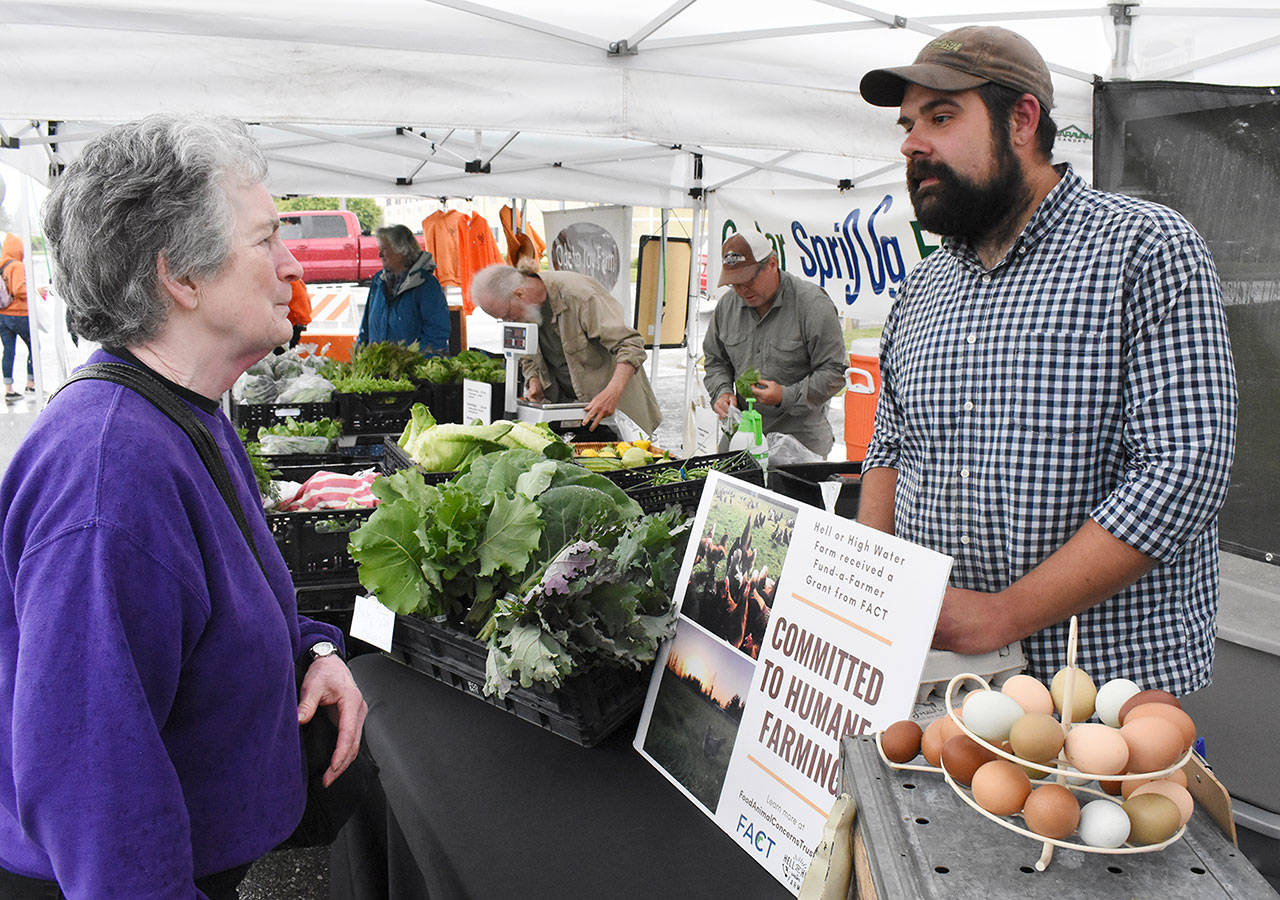Their farm life began, ironically, in an urban Seattle apartment. But things quickly progressed to a suburban plot of land and, eventually, culminated in Enumclaw’s Hell or High Water Farm.
That’s the growing story of Desiree and Kevin Helfrick, a couple dedicated to fresh ingredients and an natural way of producing them.
From their five acres outside Enumclaw, the Helfricks harvest a variety of fruits and vegetables, grow flowers and collect eggs from their free-range chickens. Their efforts are on display every Thursday and at Enumclaw Plateau Farmers Market, each Tuesday at the Renton market and through direct sales to customers who participate in their Community Supported Agriculture program.
For their dedication to keeping things natural, the Helfricks this spring received a Fund-a-Farmer grant from Food Animal Concerns Trust. The national, nonprofit organization strives to promote the safe and humane production of meat, milk and eggs.
The Enumclaw couple are using their cash award to purchase a pair of Great Pyrenees dogs that will watch over a pasture of laying hens. The pups are on order from an Idaho breeder and will provide a natural means of protecting chickens from aerial predators, coyotes and anything else seeking a free meal.
“Small and mid-sized sustainable farms are essential to meeting consumer demand for humanely-raised food,” said Larissa McKenna, the director of FACT’s humane farming program. But the reality, she said, is that small operations face financial challenges due to high costs associated with economies of scale. “Our organization supports farms like Hell or High Water Farm by funding projects that improve animal welfare and also help farmers increase their profit margins,” she said.
WHERE IT ALL BEGAN
A decade ago, while apartment dwellers in Seattle’s Lower Queen Anne neighborhood, the Helfricks took a rather simple step. They began filling abandoned planters with heirloom tomatoes, pumpkins, strawberries and blueberry plants; it was all for personal use but launched a life of producing organic, locally-sourced vegetables and herbs.
Within a few years, the couple were urban homesteaders, having advanced to a rented home in Seattle. From their Wallingford neighborhood, they had backyard chickens and had added grapes, hops, flowers and fruit trees to their growing operation. It was clear they were destined for something more than being hobby farmers, growing for their own table.
A key transition came in 2015 when Kevin participated in the Organic Farming Education Program, offered by Tilth Alliance. Located in Auburn, it offers education for beginner farmers and serves as a business incubator. For three years, he grew vegetables and flowers and kept flocks of laying hens at Tilth’s Red Barn Ranch.
“It was nice being around like-minded individuals,” Kevin says of his relationship with Tilth.
After a couple of brief stops, it was in 2018 that the Helfricks moved Hell or High Water Farm to Enumclaw’s Cart Before Horse Farm. They live in a home on the property and use five acres of land, all nestled in a rural setting just north of Enumclaw.
While Desiree continues her day job off the farm, Kevin has transitioned to full-time work at Hell or High Water. He tends a flock that, these days, is producing upward of 150 eggs per day and nurtures the land that produces a wide range of vegetables and flowers.
There were tough lessons to be learned along the way, but Kevin said there are no regrets when it comes to leading a particular kind of farm life.
Standing in a barn, looking out over his flock, he says, “This is one of the only things that has made my heart sing.”
THE MISSION
“Our work is grounded in a deep respect for our natural world and all the creatures in it,” the Helfricks write on their website (hellorhighwaterfarm.com). “We believe it is our responsibility as farmers to foster sustainable agricultural practices as stewards of the land and our community.”
Take their chickens, for example: “We believe firmly that all creatures have a right to sun, fresh grass, and the freedom to engage in behaviors which are innate to their species,” the Helfricks write. The birds are moved from spot to spot, held in place by solar-powered electric fencing, enjoying pasture life from sunrise to sundown.
“Our goal is for the chickens to have a million great days and just one bad one,” Kevin said, with a nod to the reality of life as a farm bird.
Vegetables and flowers originate from certified organic, non-GMO seeds, with an emphasis on heirloom varieties.
The Helfricks go so far as preferring hand tools to tractors when it comes to tilling the land, and certain plants are used to attract useful insects that eat pests.


